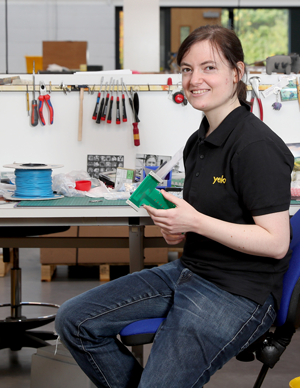Judith Bell - Electronic Engineer, Yelo
I’m originally from Carrickfergus and I went to Belfast High School, then Ulster University Jordanstown. I never considered engineering before as we were doing woodwork and mechanical design in technology class at school. I wasn’t very good at drawing or cutting and I was quite weak in maths at the time. However as soon as we started learning about electronics, my mind was changed. I was suddenly curious to learn more, I was inspired to design (even with my limited knowledge at the time), and I actually enjoyed doing maths when I was doing meaningful calculations! This in turn encouraged me to persist with maths as I knew the more I could do, the more I could learn about electronics. This change of perspective helped change my perspective; I now enjoy difficult problems, as I look forward to that joyful moment of finally understanding – something which I get to experience often as an electronic engineer.

I studied Electronic Engineering with German Masters undergraduate degree. This means I studied for 5 years, including one semester studying at a university in Germany, and completed my master’s thesis in final year.
Uni was quite a big change from school, as an adult learner you’re very much responsible for your own learning. Instead of regular homework, you’re be given two or three assignments which count towards your final grade. You have a lot more time to work on it, but it’s more effort so you need to get good at time management. A lot of courses have modules in common, so you work on group projects with people from different disciplines, as you will be expected to in your future career.
In my course at Uni, you are required to complete an industrial placement during your third year. In the summer before I went to university I’d completed a week’s work experience at Yelo, so when it came to applying for my placement, I decided to approach them directly to ask if they had any placement opportunities for me. They invited me for an interview and following that I secured my placement.
During my placement I was working in the test department, and I got the opportunity to travel to commission a test system with one of our customers. I also worked briefly on wiring the test racks during my placement, so I developed a broad range of theoretical and practical engineering skills.
In fourth year, I was able to complete a semester at a university in Germany, as part of a university exchange program. I was studying with local and international students in the first semester of a master’s of electrical and electronic engineering. As it was an international course, it was delivered in English. I had an additional German module which helped me improve my German language skills as well.
That semester was very different to all my others at Ulster, as there were fewer assignments, but they were more difficult. The exams were open book, meaning you could bring notes. I found they were more difficult, and you only had 90 minutes to complete them, so no time to correct mistakes.
Since I graduated last year, I have been working as a junior design engineer at Yelo. While I was searching for jobs before graduation, I contacted Yelo to ask them if there were any job opportunities. They told me that they were branching out more into R&D, and there would be a position for an electronic design engineer opening, for which I then applied, was interviewed and then hired.
Since starting my work at Yelo, I have learned to use various CAD packages to design and run electrical and electronics simulations. I often write reports of my findings which inform future design decisions, helping set the direction of future research.
I have also recently been made technical lead on jobs relating to my research, so I have been able to learn a lot more from this practical experience and to apply the knowledge I have gained here.
For the future I endeavour to learn as much as possible, not only improving academic engineering skills, but vital soft skills as well. As an engineer, I need to be knowledgeable about my own topic, but will also need to communicate with colleagues and customers, who will have a different understanding and perspective on the topic.
Of course, as an engineer myself, I’m sure it’s obvious my first piece of advice would be to go for it, and don’t let anyone stop you! So often people regret giving up on their dreams because someone once told them they weren’t good enough or it wasn’t right for them. You don’t even need to go the standard GCSE>A-Level>University route. Many people go to technical colleges or do an apprenticeship, which offer more practical experience and a lot more hands-on learning. Explore your options, and find what’s the best for you.